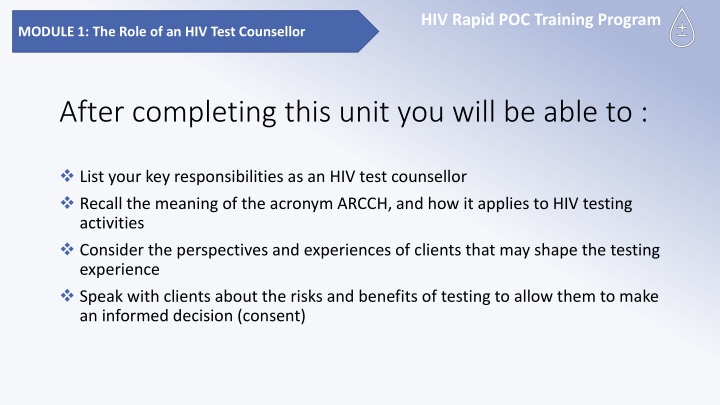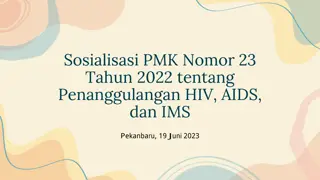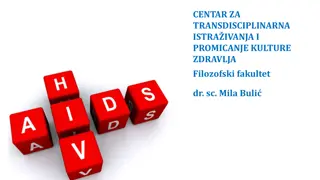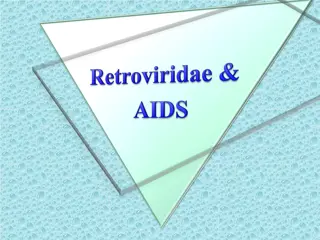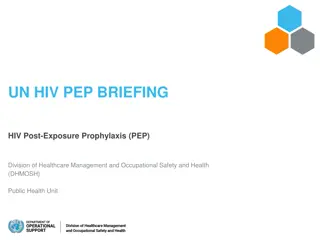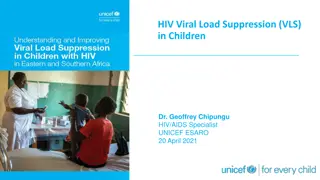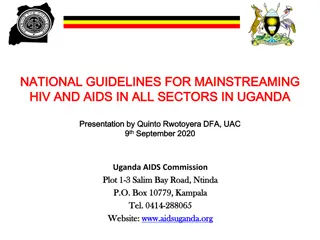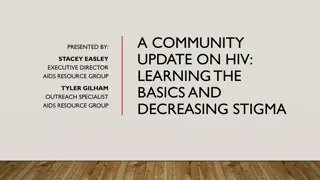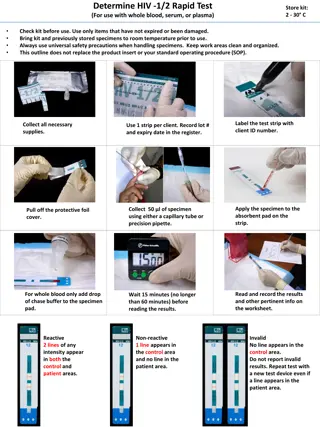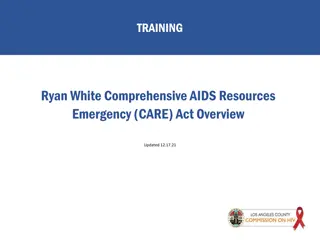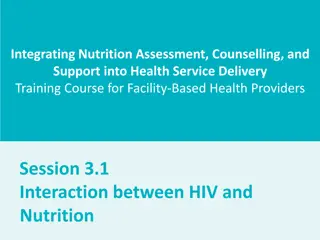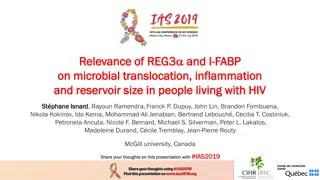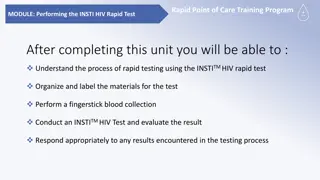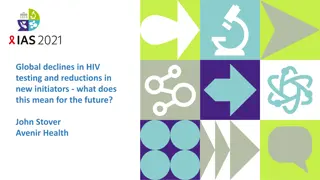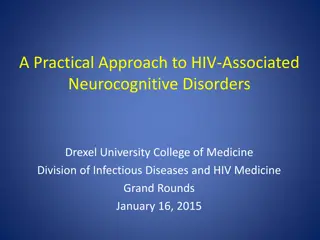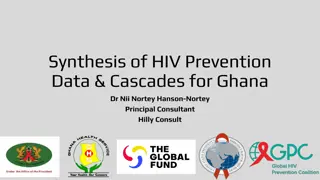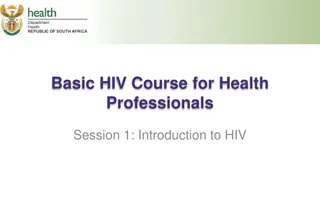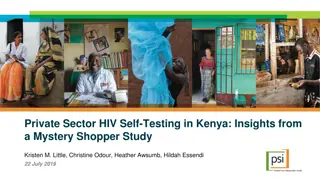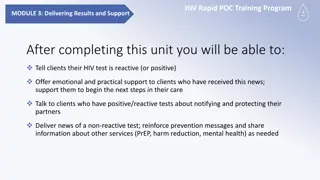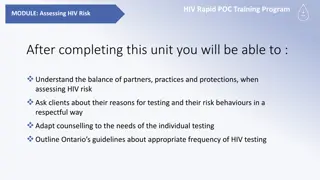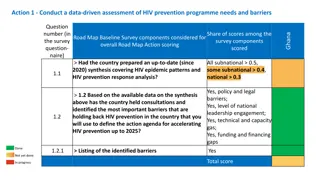HIV Test Counsellor Responsibilities and Importance of ARCCH Guidelines
In this module, you will learn the key responsibilities of an HIV test counsellor, the significance of the ARCCH acronym in HIV testing activities, the importance of considering clients' perspectives, and how to discuss risks and benefits of testing for informed consent.
Download Presentation

Please find below an Image/Link to download the presentation.
The content on the website is provided AS IS for your information and personal use only. It may not be sold, licensed, or shared on other websites without obtaining consent from the author.If you encounter any issues during the download, it is possible that the publisher has removed the file from their server.
You are allowed to download the files provided on this website for personal or commercial use, subject to the condition that they are used lawfully. All files are the property of their respective owners.
The content on the website is provided AS IS for your information and personal use only. It may not be sold, licensed, or shared on other websites without obtaining consent from the author.
E N D
Presentation Transcript
HIV Rapid POC Training Program MODULE 1: The Role of an HIV Test Counsellor After completing this unit you will be able to : List your key responsibilities as an HIV test counsellor Recall the meaning of the acronym ARCCH, and how it applies to HIV testing activities Consider the perspectives and experiences of clients that may shape the testing experience Speak with clients about the risks and benefits of testing to allow them to make an informed decision (consent)
HIV Rapid POC Training Program MODULE 1: The Role of an HIV Test Counsellor Your Role as an HIV Test Counsellor Learn about the client s needs. This is accomplished by talking to the client and by learning, in advance, about needs and challenges faced by the communities you serve. Offer support and referral to needed services including prevention, HIV care and testing for other sexually transmitted and blood-borne infections. Explain the test and provide information about HIV risk and transmission as per the client needs. Make sure they consent to HIV testing before it happens. Provide complete and accurate information on all test requisitions. When conducting rapid HIV testing, perform the procedures correctly and carefully. Provide initial emotional, social and medical support when people have a reactive test.* * The results of a rapid test are reported as reactive/non-reactive. Standard testing must confirm that the client is HIV positive.
HIV Rapid POC Training Program MODULE 1: The Role of an HIV Test Counsellor ARCCH In Ontario, HIV Testing is Ontario s testing guidelines specify that all HIV testing services (including point of care) are: Adapted Each testing interaction responds to the needs of the client and is shaped around their concerns and questions Respectful Each testing interaction engages with clients with respect and honesty, exploring issues of risk in non-judgement and non-stigmatizing ways Consenting People who test for HIV must choose to take the test and have considered how a reactive (positive) test might impact their life Confidential People who test for HIV are confident that their privacy will be respected High Quality People who test for HIV are accessing a continuum of high-quality services including accurate HIV testing, but also referral to other needed prevention and care services
HIV Rapid POC Training Program MODULE 1: The Role of an HIV Test Counsellor The Test Appointment A client has made an appointment where HIV testing will be discussed. There are five stages to the appointment: 1) Introducing the testing conversation 2) Assessing risk and the client s service needs 3) Explaining the test and obtaining consent 4) Performing the test 5) Providing follow-up support around the test results and referral to services A comprehensive checklist of all of the information to be covered in a testing appointment is included in your handout. This training module talks about how to approach these discussions using the ARCCH framework; the next module in this series will dive deeper into how to assess risk. Other modules deal with explaining the science behind the test, performing the test and offering support around test results.
HIV Rapid POC Training Program MODULE 1: The Role of an HIV Test Counsellor A Adapted Focusing on Client Needs Each test appointment is a conversation between you and the client about HIV and their health and concerns. The checklist is a guide, not a script! Some clients need and want extensive information about HIV risk, and about the test itself testing needs to take time with these clients to ensure that they get the information they want. Some clients will be reluctant to talk about their risks and behaviours making it more challenging to assess risk. Try to get accurate information, but don t press for what people don t want you to know. Some clients test routinely. They know about risk, and about the test, and want to test quickly. Facilitate this. Some test sites in Ontario are now offering express testing programs for these clients. Let the client needs set the amount of information provided.
HIV Rapid POC Training Program MODULE 1: The Role of an HIV Test Counsellor A Adapted Focusing on Client Needs Here is how you might start the testing appointment. What the client says about why they are testing will shape the appointment. Hi I am ___. I am a counsellor here. So you are here for an HIV test? OK, I will be doing your test for you. What made you come in today? (If the client hesitates, prompt: Is it part of your routine? Did something happen that worries you?) Exposure the client is concerned about. It is part of my routine New relationship or change in the client s life (break-up) that might increase risk Client has been notified by public health about a past exposure.
HIV Rapid POC Training Program MODULE 1: The Role of an HIV Test Counsellor A Adapted Focusing on Client Needs What is My Job? What is Not My Job? Offering testing services that respond to the client s specific needs and circumstances Extensive counselling to reduce risk: Help clients understand their HIV risk and promote use of local resources (including risk reduction programming), but be realistic. Changing behaviour is a long-term process. Referring clients who are at risk to additional resources, such as local AIDS Service Organization programs for risk reduction, harm reduction programs, mental health care and/or PrEP prescribing)
HIV Rapid POC Training Program MODULE 1: The Role of an HIV Test Counsellor R Respectful Guided by the Client s Values All of us bring values and beliefs to the work that we do, however a conversation about testing and risk must be guided by the client s values not yours. Experiences of being judged by health and services providers is a major barrier to HIV testing. Many people coming forward for testing have experienced discrimination (homophobia, racism) and marginalization in the past. They are seeing you through these experiences. Many women and men in the populations we serve have experienced violence and trauma. Presume this is true of all clients. Ask before you touch. Don t delve into details you don t need (such as risks prior to their last HIV test). Learn more about trauma aware care. Being a good, unbiased person is not enough. You need to learn about the issues impacting the population(s) you serve.
HIV Rapid POC Training Program MODULE 1: The Role of an HIV Test Counsellor R Respectful Guided by the Client s Values How to Learn More During the training process you will often shadow a more experienced tester. Pay attention to what they say, and how they say it not just to how they do the test. ASK afterwards about anything that you didn t understand in conversations with clients. Testing sites often have partnerships with other organizations in your community. Learn about these organizations, the populations they serve and the services they offer. Learn More about client needs and cultural competency. Ontario recognizes five priority populations that are most at risk of HIV infection. Cultural competency in dealing with the communities you serve must be part of your practice. Links to basic resources about the needs of each priority population is included in your participant s handout.
HIV Rapid POC Training Program MODULE 1: The Role of an HIV Test Counsellor R Respectful Guided by the Client s Values What is My Job? What is Not My Job? Making critical comments or judgements about a client s choices or culture Offering testing services that respond to the client s specific needs and circumstances in a respectful way Asking detailed questions about sexual or drug use practices beyond what is needed to establish the possibility of risk Learning about the populations your testing site serves and about culturally competent practice Making assumptions about who will or won t follow-up on a referral Helping clients understand their HIV risk
HIV Rapid POC Training Program MODULE 1: The Role of an HIV Test Counsellor C Consent Supporting Informed Choices Consent is a requirement of all HIV testing in Ontario. Clients can decide not to test at any time and can decline follow-up such as confirmatory testing of a reactive result. Make sure that all clients to be tested understand that: If you are doing a rapid POC test, It only takes a few minutes to determine the result. Make sure the client is prepared. Although a reactive POC result needs to be confirmed with standard testing, in almost all cases, it will mean that the client is HIV-positive. Being HIV-positive means they have a chronic condition that will need ongoing treatment; with treatment they can live a long and healthy life. If the test is reactive, you will connect them to care. The client has thought about how they will respond to a positive result, and has an idea about who in their life they can turn to for support. Knowing their status will mean that they are legally required to disclose their status to past partners. There are services to help them do so anonymously, if needed. They will also need to disclose to future partners until they have an undetectable viral load.
HIV Rapid POC Training Program MODULE 1: The Role of an HIV Test Counsellor C Consent Supporting Informed Choices Testing Clients Under 18 Years of Age Under the Health Care Consent Act (1996) anyone capable of giving informed consent can be tested. If a teen is seeking counseling and understands what an HIV test and why they want it; make a note that they have demonstrated capacity and offer testing A parent can consent on behalf of a minor, however if a child or teen seems to be coerced do not provide testing HIV Testing and Mental Health A mental health diagnosis should not be a barrier to testing. However if a client is too impaired or disoriented to make an informed choice, testing should be delayed until this circumstance changes
HIV Rapid POC Training Program MODULE 1: The Role of an HIV Test Counsellor C Consent Supporting Informed Choices What is My Job? What is Not My Job? Performing a test for a person who does not understand its purpose Ensuring that clients know they have the right to decline testing at any point Hiding HIV testing within other testing so that the client does not understand that an HIV test is being done Ensuring that clients understand that HIV is a chronic condition; if they test positive they will need to pursue treatment to control that condition Minimizing the emotional and health impacts of testing HIV-positive
HIV Rapid POC Training Program MODULE 1: The Role of an HIV Test Counsellor C Confidential Guarding Client Privacy The evidence shows that concerns around privacy are another major barrier to HIV testing. Talk to clients about why information is collected and how it is protected at your site. Assure concerned clients that their results are kept securely and not shared with staff who are not directly involved in their care. Tell clients that anonymous testing is available in Ontario, and help them find the nearest anonymous testing location if they prefer. Explain what information is sent to the Public Health Labs about an HIV test, and what information is sent by the laboratory to local public health authorities Make privacy part of your practice. Be careful where you leave paperwork, as well as where and how you speak about clients, even if you are not using names.
HIV Rapid POC Training Program MODULE 1: The Role of an HIV Test Counsellor C Confidential Guarding Client Privacy Whenever a clients has an HIV test, a requisition for the test is sent to the Public Health Laboratory: Anonymous requisitions include a reference number and the year of a person s birth Nominal requisitions include the person s name and birth date Both kinds of requisitions include information about gender, ethnicity and risk factors Reassure clients. This demographic information is not collected to track them. It is used to improve Ontario s prevention and testing programs. Part of your role as a HIV test counsellor is to gather this information from your clients as completely as possible and report it accurately.
HIV Rapid POC Training Program MODULE 1: The Role of an HIV Test Counsellor C Confidential Public Health Reporting A positive HIV test is considered a condition of public health significance under Ontario law. An HIV-positive result on a standard laboratory HIV test or a reactive POC test is automatically reported by the Public Health Laboratory to the local public health unit. If the client is being tested using their name and OHIP number, the public health unit will follow-up with them to offer support. They will ensure that a client s former partners (sexual and drug use) are notified, without revealing their identity. If a client tests anonymously, this follow-up cannot occur. Clients are responsible for disclosing to their sexual contacts. Disclosure support can be arranged anonymously if needed. More detail about supporting disclosure to partners is included in the module on supporting someone who tests positive.
HIV Rapid POC Training Program MODULE 1: The Role of an HIV Test Counsellor C Confidential Guarding Client Privacy What is My Job? What is Not My Job? Sharing non-medical information or anecdotes revealed in a testing appointment with anyone else Protecting client information from anyone (including other staff that does not need to know) Sharing medical information with anyone who does not need to know to secure appropriate care for the client and/or their contacts Providing clear information to clients about public health reporting and partner notification
HIV Rapid POC Training Program MODULE 1: The Role of an HIV Test Counsellor H High Quality Care Linking to Services When a client comes for HIV testing they are thinking about protecting their health. Whether they test positive or negative, you can build on this momentum and connect them to services. Your site should maintain materials about services in your area that your clients might use. Refer clients to risk reduction programs at local AIDS Service Organization, and know where harm reduction supplies are available. Addictions and mental health challenges can be significant barriers to prevention. Know about the services in your area and help people access them whenever appropriate. When a client has a reactive test, you are their link to ongoing care. We will talk about this more in the module on supporting someone who tests positive.
HIV Rapid POC Training Program MODULE 1: The Role of an HIV Test Counsellor H High Quality Care Dealing with Anxiety Sometimes a provider may encounter clients experiencing high anxiety about HIV infection with no or low HIV risk (HANLR). HANLR clients have different needs than other clients seeking HIV testing. The counselling guidelines for clients with high HIV anxiety and no/low risk (Hassle Free Clinic, Toronto) will help you focus on guiding clients toward addressing their anxiety. In all cases, proactive referrals for more intensive counselling/therapy should be made available to the client.
HIV Rapid POC Training Program MODULE 1: The Role of an HIV Test Counsellor H High Quality Care Preventative Drug Therapies Preventative drug therapies (PrEP and PEP) are options that your clients may not have considered. Discuss these options, whenever appropriate, and if your site cannot prescribe them, refer to outside services. For providers see www.ontarioprep.ca Post-exposure Prophylaxis (PEP) - the use of anti-HIV drugs to prevent HIV infection after a high-risk exposure. Clients must begin therapy within 72 hours. PEP reduced the risk of HIV infection by 80%. Pre-exposure Prophylaxis (PrEP) - the ongoing use of anti-HIV drugs to prevent HIV infection. Consistent use of PrEP virtual eliminates the sexual risk of HIV infection and cuts the HIV risk of needle sharing in half. PrEP PEP More details about PEP and PrEP are available in your handout.
HIV Rapid POC Training Program MODULE 1: The Role of an HIV Test Counsellor H High Quality Care Linking to Services What is My Job? What is Not My Job? Being a long-term support person for any client or solving their problems. You job is to provide HIV testing and link them to other services Knowing about prevention, harm reduction and care services in your area Directing clients to these services Providing reviews of other services. It is up to a client to make decisions about the best local providers for them Performing rapid HIV testing accurately and correctly (We ll talk about this in future modules)
